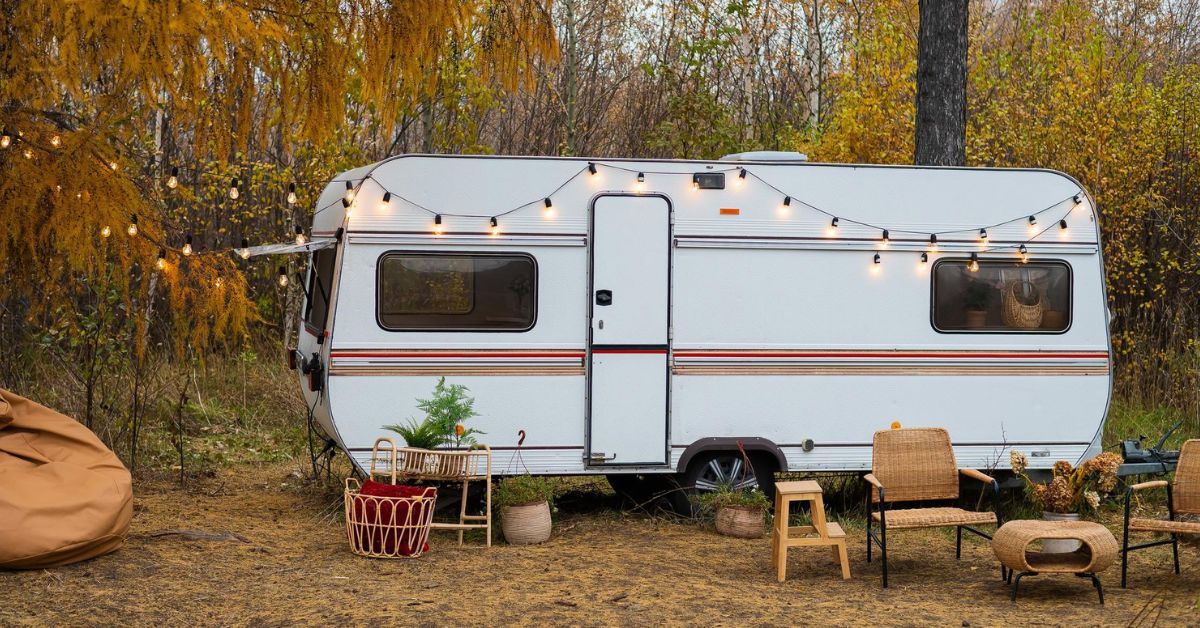Travel trailers provide unparalleled freedom and adventure when you are on a journey. Travel trailers are ideal for exploring national parks, weekend getaways, and full-time living on the road. In all the excitement, don’t forget to think about your investment’s security and safety. It brings us to the important question: do you need insurance on a travel trailer? Like any valuable asset, travel trailers are at risk of accidents, theft, and natural disasters.
If you do not have the right insurance coverage, you may face significant financial losses and liabilities. A travel trailer insurance policy will not only protect your vehicle but ensure your peace of mind as well. In this article, we’ll explore the necessity of travel trailer insurance, the types of coverage available, and how to choose the right policy for your needs. Let’s dive in.
What is Travel Trailer Insurance?
Travel trailer insurance protects your trailer from various risks, like accidents, theft, and natural disasters. It functions similarly to auto insurance, offering financial protection for repair or replacement costs. The most important coverage types are liability, collision, and comprehensive, which cover non-collision incidents like theft or fire.
Additional coverage, like personal effects and roadside assistance, can make you feel even safer. When you know these coverages, you’ll have peace of mind while you’re on the road.
Do You Need Insurance on a Travel Trailer?
Yes, you need insurance on a travel trailer. While not legally required in all states, having insurance is highly recommended to protect against theft, accidents, and damages. It provides financial security and peace of mind while traveling. In addition, comprehensive coverage is essential if your trailer is financed or used full-time. Make sure you check your state’s regulations and consider your specific needs before getting travel trailer insurance.
Legal Requirements for Travel Trailer Insurance
Travel trailer insurance requirements vary based on your location and the type of trailer you own. Many states and provinces require liability insurance if your travel trailer is towed by a vehicle. This insurance covers any injuries or property damage you may cause to others while towing your trailer.
However, the specific laws can differ significantly. For example, some states require separate trailer insurance, while others just require coverage through the towing vehicle’s insurance. You should check with your local Department of Motor Vehicles (DMV) or insurance company to make sure you comply.
In addition, if you finance your travel trailer, your lender might require comprehensive and collision coverage. Even if it’s not legally required, insurance is highly recommended to avoid out-of-pocket expenses. Traveling safely and worry-free requires knowing the legal requirements and having the proper coverage.
Benefits of Having Travel Trailer Insurance

There are numerous benefits to investing in travel trailer insurance, including financial protection and peace of mind. Such as:
Protection Against Accidents and Damages
Travel trailer insurance is primarily designed to protect you from accidents and damages. The right insurance coverage ensures that your trailer is covered if it’s damaged by a collision or natural disasters like hail and storms. It’s a great way to save money and get your trailer back to its original condition quickly.
Coverage for Theft and Vandalism
When parked or stored in unfamiliar locations, travel trailers are vulnerable to theft and vandalism. Comprehensive insurance includes coverage for these unfortunate events. Insurance can cover the cost of stolen items, repairs, or even the replacement of your trailer if it’s stolen or vandalized. As a result, you don’t have to bear the full brunt of the losses when such things happen.
Liability Protection
Liability protection is a crucial component of travel trailer insurance. This coverage helps cover medical expenses, legal fees, and repair costs in the event of an accident that causes injuries to others or damage to their property. Without this coverage, lawsuits or compensation claims could leave you with significant financial burdens. Having liability insurance ensures you’re not left with an economic mess if something terrible happens.
Peace of Mind While Traveling
One of the most valuable benefits of travel trailer insurance is its ability to provide peace of mind. Traveling without constant worry about potential mishaps is easier when you know you’re covered. If you’re on a weekend getaway or a cross-country trip, this assurance helps you enjoy the journey more and worry less.
Factors to Consider When Deciding on Insurance
There are several important factors to consider when determining whether to purchase travel trailer insurance:
Value of the Travel Trailer
The value of your travel trailer is a crucial factor in deciding on insurance. High-value trailers generally require more comprehensive coverage to protect against potential losses. Don’t forget to take into account the original purchase price, current market value, and any upgrades you’ve made. Comprehensive coverage ensures that your investment is fully protected.
Frequency and Duration of Use
How often and how long you use your travel trailer can influence your insurance needs. If you’re a frequent traveler or have lived in your trailer for a long time, you might want more coverage. In comparison to standard policies, full-timer coverage offers broader protection for those who live in trailers full-time.
Travel Destinations
Where you plan to travel with your trailer also impacts your insurance requirements. If you’re traveling across state lines or into a region with a high theft or accident rate, you might need more coverage. Additionally, international travel, like trips to Canada or Mexico, might require special insurance policies.
Storage Conditions
When you’re not using your travel trailer, you should consider the conditions in which you store it. Secure, weather-protected trailers may face fewer risks than those left outside or unprotected. If your trailer is stored in a secure facility, some insurance providers will give you a discount.
Personal Belongings
If you have valuables in your trailer, you might need personal effects coverage. This will protect your electronics, camping gear, and personal items from theft and damage. Make sure you get adequate coverage based on the value of your stuff.
Travel Trailer Insurance Costs

Travel trailer insurance prices vary based on several factors, including the trailer’s value, coverage types, usage frequency, and storage location. In general, premiums range from $250 to $1,500 a year. Trailers with high values, comprehensive coverage, and frequent use can increase costs, but secure storage and a good driving record can lower them.
Bundling policies, keeping a clean driving record, storing your trailer securely, and shopping around for quotes will help you save. The more you know about these factors, the easier it will be to find an affordable policy that offers the protection you need.
How to Choose the Right Policy
You need to think about several factors when picking the right insurance policy. Here’s a step-by-step guide to help you make an informed decision:
Assess Your Needs
Start by assessing your specific needs based on how you use your travel trailer. Consider things like your trailer’s value, your frequency and duration of trips, and your destinations. If you live in it full-time, your trailer needs more comprehensive coverage.
Compare Coverage Options
There are a variety of coverage options available from different insurance providers. Compare policies to see which ones offer the best protection for your needs. Choose a policy that includes comprehensive and collision coverage, personal effects coverage, liability protection, and roadside assistance and emergency expenses.
Check Provider Reputation
Make sure insurance providers have a good reputation for customer service and claims handling. Read reviews, ask for recommendations, and check ratings from independent agencies. Providers who have a good reputation will provide you with reliable coverage and support.
Understand Policy Details
Make sure you read the fine print of each policy to find out what is covered and what is not. Pay attention to details such as deductibles, coverage limits, and any additional fees. Make sure the policy covers all potential risks and that there aren’t any unexpected exclusions.
Consider Discounts
Many insurance providers offer discounts that can reduce your premiums. A good driving record, bundling policies, and storing your trailer in a secure location can all result in discounts. Ask your provider about any available discounts to ensure you’re getting the best rate.
Get Multiple Quotes
Compare prices and coverage options from several insurance providers. Getting multiple quotes allows you to determine which provider offers the best value. Make sure the policy covers what you need, not just the cheapest one.
Consult an Insurance Agent
If you’re not sure which policy to buy, talk to an insurance agent who specializes in travel trailers. With an agent, you’ll get personalized advice, understand complex policy details, and choose the best coverage.
FAQs
Do you need insurance on a travel trailer in Florida?
No, Florida does not legally require separate insurance for a travel trailer. While your auto insurance may cover your liability when towing, it won’t cover trailer damage.
A comprehensive insurance policy protects against theft, vandalism, accidents, and natural disasters. Additionally, some campgrounds and parks may require proof of insurance for your stay.
Do you need insurance on a new travel trailer?
Yes, it is highly recommended that you get insurance on a new travel trailer. Although not legally required, insurance protects you from theft, vandalism, accidents, and natural disasters.
Moreover, if you financed your trailer, your lender probably wants comprehensive coverage to protect their investment. It gives you peace of mind when you’re traveling with your new trailer.
Do you need insurance on a travel trailer in Texas?
No, Texas does not legally require separate insurance for a travel trailer. However, having insurance is highly recommended. Your auto insurance may cover liability when towing, but it won’t cover trailer damage.
Travel trailer insurance protects you from theft, vandalism, accidents, and natural disasters. In addition, some campgrounds and parks require proof of insurance before letting you stay, so it’s a good investment.
Is travel trailer insurance required in California?
Yes, travel trailer insurance is required in California. As with your home or car, your travel trailer needs its insurance policy. RV insurance covers motorhomes, travel trailers, toy haulers, fifth wheels, boats, personal watercraft, snowmobiles, ATVs, and medium-duty trucks. Travel trailer insurance protects your trailer from theft, vandalism, accidents, and natural disasters so you can rest easy.
Do you have to insure a trailer in Michigan?
Yes, you need insurance for your trailer if it has more than two wheels in Michigan. In contrast, if your trailer only has two wheels, insurance is not required. Towing a trailer with more than two wheels involves compliance with state regulations and protection from potential liabilities. Adding comprehensive coverage to your insurance policy will help protect you against theft and damage.
Do I need trailer insurance in Virginia?
Yes, you need trailer insurance in Virginia if your trailer is registered. Although trailers don’t need separate insurance, it’s a good idea to have it. It protects against liabilities for accidents and damages that may occur while towing.
Additionally, if your trailer has a motor or is used for commercial purposes, insurance may be required. With comprehensive coverage, you’re protected against theft, vandalism, and damage.
Read More: What To Select For SwissCare Travel Insurance
The Takeaway
When deciding if you need insurance for a travel trailer, you have to weigh the benefits against the risks. In some states, insurance isn’t required, but having comprehensive coverage gives you peace of mind. It protects your investment from theft, accidents, and damages. It’s wise to invest in the right insurance policy whether you use your trailer occasionally or as a permanent residence.


